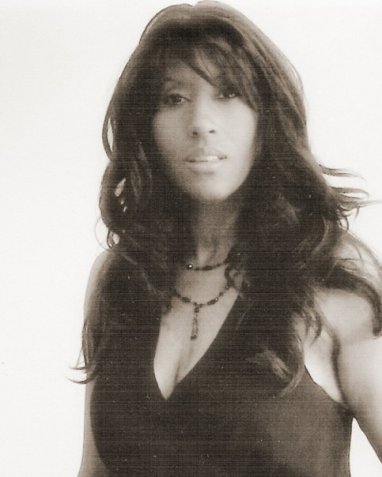
I met Heather Bishop in 2011 on a commercial shoot for a Christian radio station. She was one of several singers who sang the jingle repeatedly in front of Austin landmarks. As choreographer, I danced behind the cameraman during each take and pantomimed “Smile!” for each singer, most of them church luminaries a bit stiff in their delivery. Not Heather. She was smooth, her voice unfailing; off camera she was serene and good-natured. My immediate favorite. Afterward, we saw each other at shows around town—until one day I realized that years had passed. Then Facebook revealed that she’d been enduring heavy changes.
“I’ve had some significant medical issues,” she explained recently when we met over coffee. “So I’ve been reassembling my life. … As a woman, an individual and an artist, all of this can really begin to overwhelm your identity and make you question why you are here and what it is you’re still here to accomplish.”

A stroke upended Heather’s life and career as a musician, songwriter, poet, author and playwright in 2015, leaving her memory and motor skills ravaged. She had to relearn how to eat, talk, write, sing, play instruments. Several years of memories were just gone.
“I liken it to having a whiteboard cleaned. There was a lot of information written, then someone came along and wiped the board. There was just a little information left.”
Heather made the picture clearer with a story: “I was in my doctor’s office after a medical incident one day a few years ago. I was trying to tell her something. She stopped me. She leaned in close and held my face in her hands and looked at me to make sure that I could really see her. She said, Honey, I need you to listen. The words you think you are saying are not the words that are coming out, OK? I need you to understand that. I know that you are still in there. I need you to work really hard. And I need you to come back to me, OK? It was incredibly poignant. I did hear her, and it was the first time that I understood that a medical incident had just occurred. I set my intention to recover.”
With the help of her parents and friends researching her condition, Heather began the steep climb of recovery. She pursued speech therapy at home. Music therapy helped her regain cognitive abilities and motor skills. Upon her physician’s advice, she began learning to write again.
Hear Heather’s experience of relearning to play music after a stroke.
But in 2016, she had another stroke, and smaller but more frequent ones followed. “None of the successive ones have been like the first one, thank goodness,” she says. “What they have done is take away some progress, which is frustrating.” Complications piled up: broken bones, cardiac events, degeneration of her body’s systems.
“Things are degenerating with nothing stopping them right now,” Heather said. “I made the decision not to do any more experimental things and just feel good as long as I can.”
The pitfalls that come with medical events have become familiar to her. “I can still do my job very well because I’ve been doing it for so long,” she said, “and I can do a lot of my art, still … but I can’t find my socks. Cannot operate a can opener. My activities of daily living are severely compromised.”
Listen to Heather describe losing the past and working toward the future.
Another riddle she’s trying to solve is the Catch-22 of advocating for herself in a medical crisis, especially one that compromises brain function. “I don’t know how to tell you what I need,” she explained. “I often won’t know until I’m in the moment, and then I don’t know how to communicate it correctly.”
“I don’t know how to say it until it’s an emergency, and in the emergency, I don’t know how to say it.”
Having a medical representative would be key, she says. “You need someone to advocate for you, someone who’s in charge,” she explained, not only mid-crisis but also during the aftermath and recovery. “Now I’m just feeling overwhelmed, trying to make decisions and figure out what’s next and how to do it. … I need a project manager to help me facilitate the things that need to be done.”
* * *
Heather’s origin story diverges from that of many other OG Austinites: She was born in New York into a family with Caribbean, African-American, and Native American roots. They moved here in the 1970s. Her mother, a medical professor, and her father, a pilot and aviation official, encouraged high standards for academic achievement, a love of cooking and travel, and a hunger for literary and musical pursuits.
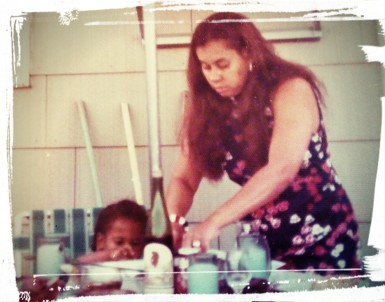
“Everyone wrote, and everyone played music,” said Heather of her family, “and everyone did something else [for work]. I think they gave me a cello when I was four, and I started playing piano as a toddler. … Music and writing were your baseline; that was just who you were.” Her family and their artistic background have been part of the support system during her recovery.

“Throughout all of this, I’ve produced books, albums, theater, photography and more. I still have other projects on the way.”
After each setback, Heather found a way to return to making art—as both lifeline and life’s work. The daily practice of writing was crucial to her recovery. After the first stroke, she wrote poems that were collected in 2015 for the book A Tree Like This. Several of those, plus ones she’d written for Spark, a 2012 volume, provided the material for a spoken-word album.
“On that album, Unspoken, I worked so hard,” she says. “I was literally relearning to speak. My face would cramp. I was in tears. I wanted to show, You can do this. You can hear that my voice is not ideal. I’m still a little bit mealy-mouthed. … But that was the whole point.”
“I’m relearning. I’m gonna do this. This is my defiant thing.”
It’s important to note that these poems are not just therapeutic exercises; they are poignant works of art. HEATHER BISHOP’S POETRY IS STUNNING. The images are evocative, many of them haunting. The language is deftly tuned to a key that rings clearly in a human’s inner depths. In the first two books and Mercy, her 2017 collection, the subject matter ranges far beyond her medical experiences—but several focus on their aftermath with a laser.
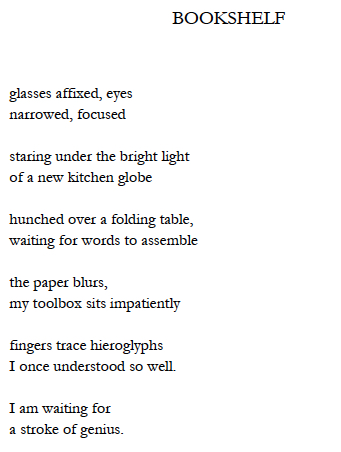
“It’s really important as an artist that I get this last album out. I mean, hopefully it’s not my last album, but you always hope for the best, prepare for the worst.”
When she mentions a cookbook on the horizon as well, I finally ask the questions on my mind: Why work so hard when you have such limited energy? Why not take a well-earned (a likely well-advised) break? She delivers the answer with characteristic gentleness:
“I’ve been working on [the cookbook, My ‘Bajan Table] for years now,” she said, “and I’m like, You have to finish this! I really don’t want the last thing ringing through the air to be focused on sorrow or illness or transformation .… I want this project to be about something completely different: a celebration of family and heritage, an integration of cultures.
“I really don’t want the last thing ringing through the air to be focused on sorrow or illness or transformation.”
“I’m not embarrassed or unhappy about the books I’ve written about losing and regaining, but that’s not the sum total of who I am as an artist or as a writer,” Heather explained.

“I’d like to assert that, No, I do really have an identity separate from these crappy things that have happened to me. The only way I can show that is by producing the work.”
I also asked about her extraordinary openness surrounding her medical journey; she has consistently shared details on social media, giving equal, unflinching space to the obstacles she’s faced and the insights she’s gained.
“I only shared,” she responded, “because I thought it would be helpful. I really never wanted to share any of this to begin with. But I thought if there’s a chance that there’s something beneficial for friends, family, for other people, then it’s worth it.”
Listen to Heather’s perspective on sharing her medical experiences via social media.
After our interview in June, Heather had another medical setback. Still, she was gracious and generous with her time and attention, and answered these questions for the AUSTIN.WOMEN.LOVE community.
HEATHER BISHOP: Q&A
AWL: How long have you lived in Austin?
HB: Since around kindergarten, first grade. I remember when Austin had no traffic and occasionally had to reroute cars around cattle in the road. My little neighborhood was more creeks and trees than houses.
AWL: What does your work look like? What do you do for a living? What do you do for passion? Have you found ways to get those to work together? Have you always been on this path, or has your career focus changed over the years?
HB: Historically, I have always had dual careers: one technical, and one in the arts. There was a time when both [fields] were quite arrogant: You couldn’t work in one and also in the other and be treated with respect. That has changed quite a bit over the years.
I thought that being friendly, professional, and talented was all that was needed to be successful.
AWL: What were you like when you were first starting your career? Have you changed in the way that you work and approach situations and people? What kind of scene could you envision if You Today hired or worked with You Starting Out?
HB: I was very young and idealistic when I started in both careers. I thought that being friendly, professional, and talented was all that was needed to be successful. I still believe in and encourage people to be friendly, professional and talented, but I have certainly grown to understand that relationships and strategic planning and a whole universe of other things are also very important.
AWL: What takes up the majority of your brain space these days? What are you working/ playing/ wrestling with currently—idea, mission, project, problem, obsession, mystery
HB: I’ve had some significant medical issues over the past several years, so this has taken up quite a lot of time and energy. Reassembling my life, figuring out what’s possible versus what’s probable, navigating new challenges, trying to make sense of what is happening, and—emotionally most important from my perspective—dealing with the impact on my family: These have taken up the bulk of my time.
As a woman, an individual, and an artist, all of this can really begin to overwhelm your identity and make you question why you are here and what it is you are still here to accomplish. Throughout all of this [medical trauma], I’ve produced books, albums, theater, photography and more, and have other projects on the way. I have a new album in progress, sort of in the spirit (though not the style) of Warren Zevon’s album The Wind. But I still have a lot of questions.
AWL: What events do you feel have been most responsible for shaping you into the person you are now?
HB: My mother joked this week that if lightning struck down in the middle of a group of people, I’d be the one to get hit. And then I’d meet some nice people and write a song about it. That’s probably the shortest and most accurate answer I could give you.
AWL: What’s your super power?
HB: Hmmm… That’s a hard one. I asked an old friend that question first, and he said that
I remind people to be better versions of themselves by always expecting them to be better versions of themselves.
AWL: How did you first recognize it?
HB: I only know it because I heard his comment. I’m not sure that I would have any other way of knowing, and I can’t vouch for the truth of the statement. I do know that I have to hold myself to the same expectations that I have of others; you can’t hypocritically have a lower set of standards for yourself and a higher set for everyone else.
Some people really appreciate that you have no negative preconceived ideas about them based on something circumstantial—that you just assume that they are good folks.
AWL: Do you like having it?
HB: Yes and no. Expecting people to be decent and ethical and make good choices can make them irritated with you because sometimes making good choices can be inconvenient. It doesn’t always jive with what we want or match our desires in the short term. And that can make people really resent you. The flipside is that some people really appreciate that you have no negative preconceived ideas about them based on something circumstantial—that you just assume that they are good folks.
AWL: Do you use it for good or evil? (Or both? Or has it changed? Please describe.)
HB: Hmm… That’s a good question. I never considered consciously using any of this. I guess I think it’s important to make sure that if you really don’t see eye-to-eye with someone, you can still think of them as a good person. Sure, some people are jerks. But by nature, a disagreement doesn’t automatically put someone in that category. Other stuff does that.
You always know that there is someone who loves you, who is celebrating your joys and grieving your sorrows, who just wants you to be happy and healthy. That’s a lot.
AWL: Who are three of your female besties? How, when and why did you become friends? Why are you still friends? Tell me the worst awesome story about one of them! (Just kidding.)
HB: My mother, my doctor, and my attorney—which sounds like the start of a joke! We are all friends, actually, and the latter two went to school with me.
Probably first and foremost, we share humor. There’s a lot of laughter, which is always grounding. And no matter what is happening, you always know that there is someone who loves you, who is celebrating your joys and grieving your sorrows, who just wants you to be happy and healthy. That’s a lot.
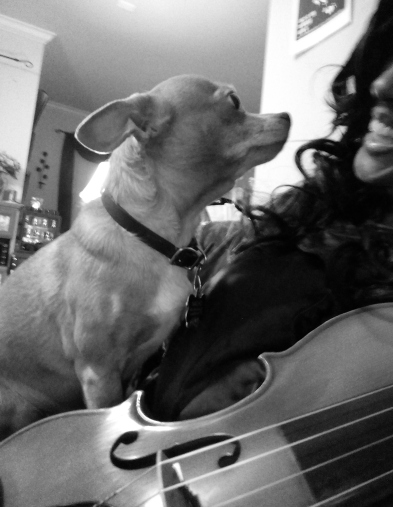
AWL: Who makes up your communities—groups, fields of work, activities, causes or crews? Have you accumulated or integrated different communities as you’ve moved into or through different areas?
HB: There’s musicians, there’s writers, kind of engineering and technical people, there’s my accounting world and friends … It’s just sort of all over the place.
I really do believe that if you see something beautiful in someone, you should sincerely tell them.
AWL: What do you do for your lady community? How do they support you in achieving your goals? Do you fall into consistent roles, or do you switch up roles as situations necessitate?
HB: For my lady community, I do a lot of listening. I’m the person you can vent to about your day, your partner, your boss, your Great Aunt Mildred who said that horrible thing last Thanksgiving, your dog, your whatever. And I won’t hold it against your partner, your boss, your Great Aunt Mildred, your dog or whatever the next time I see them because I understand that sometimes loved ones drive you nuts. Also, I compliment a lot—because I really do believe that if you see something beautiful in someone, you should sincerely tell them.
The common threads are peace, nature, travel, and an unencumbered freedom.
AWL: What effect do you most consistently work to exert on the world?
—aka—
In a yoga class, often the teacher says, “Set an intention for the class” as something to keep in mind and dedicate the fruits of your practice to. It’s usually a one- or two-word concept: peace, acceptance, strength, etc. If you were to set an intention for every day in your world, what would it be? Would it change all the time or remain the same?
HB: Rather than words per se, these days I use a lot of visual imagery. Currently this is beach, lake, or ocean scenes at sunrise or sunset. Recently it was forest scenes like one might find throughout national parks in North America, other times it has been desert scenes that one would find throughout the southwest. If I had to choose words for these images, I guess the common threads are peace, nature, travel, and an unencumbered freedom. These are all places where I used to roam as a kid.
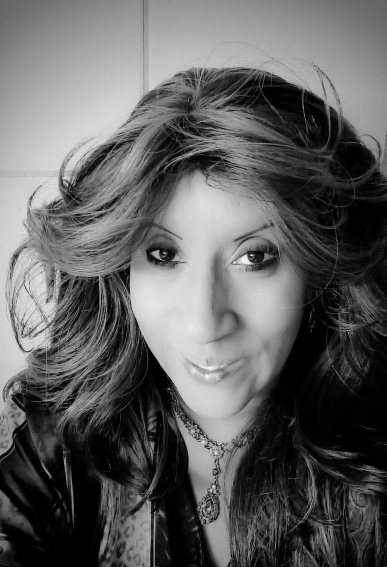
HEATHER BISHOP’S WORK
BOOKS
Mercy (2017)
A Tree Like This (2015)
Spark: Audience Optional (2012)
RECORDINGS
Flood (2018)
Dime to a Dollar: Live at One2One (2017)
Unspoken (spoken word, 2015)
The Story Sessions: Songs recorded for American Public Media’s “The Story” (2011)
Trains and Revolutions (2011)
Graceful Riot at the 710 (2001)

WOW!! Heather ROCKS!! Her soul is radiant and beautiful! Thank you, AWL for sharing her story with us! Sending healing and positive energies and vibes out to Heather…as she makes her fascinating journey!!
LikeLike